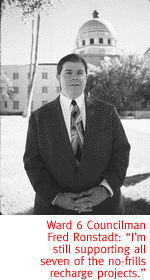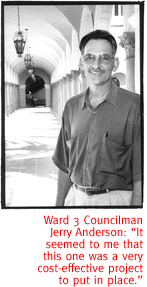
Fred Ronstadt Blocks A Plan To Test The Rillito's CAP-Sucking Capacity.
By Jim Nintzel
THE TUCSON CITY Council last week sank a plan to begin
recharging CAP water in the city's central well field, but a majority
of members promise recharge efforts will begin in earnest this
spring.
The rejected proposal would have used several existing pipes
and storm drains, along with a new 2.5-mile-long pipe, to transfer
water from the CAP canal to the Rillito River near the end of
Alvernon Way.
Mayor George Miller and three council members--Shirley Scott,
Janet Marcus and Fred Ronstadt--moved to quash the proposal after
hearing from a number of critics, who argued the plan was flawed.
 "That's what sort of put on the brakes for me," says
Ronstadt, who had declared his support for the project just days
before the vote. "But I'm still supporting all seven of the
no-frills recharge projects."
"That's what sort of put on the brakes for me," says
Ronstadt, who had declared his support for the project just days
before the vote. "But I'm still supporting all seven of the
no-frills recharge projects."
Ronstadt instead called for more studies. His motion to direct
staff to analyze those "no-frills" projects passed on
a 4-3 vote.
The seven projects have all been suggested by the Pure Water
Coalition, a citizens' group that put the Water Consumer Protection
Act on the ballot in 1995 and successfully campaigned against
its repeal last year. The law bans direct delivery of CAP water
and instead calls for Tucson to recharge its 148,000 acre-foot
CAP allotment, but in the last two years the City Council has
only implemented one recharge pilot project in Avra Valley.
Newly elected Ward 3 Councilman Jerry Anderson put the Rillito
proposal on the council's agenda in hopes of spurring recharge
efforts.
"It seemed to me that this one was a very cost-effective
project to put in place," says Anderson. "Despite previous
reviews by established water experts in this community and staff,
there still seemed to be a lot of good reasons why it would work.
Having gone out there and walked the system where this was going
to be put into place, I felt very confident we could accomplish
this and let the community and the voters know we were with them
with serious recharge of our central water field."
 The plan was supported by council members Steve Leal and José
Ibarra, but critics complained the Rillito riverbed couldn't recharge
significant amounts of CAP water. Jerry Juliani, of the Pure Water
Coalition, says the pilot program will prove or disprove that
theory at a comparatively low cost.
The plan was supported by council members Steve Leal and José
Ibarra, but critics complained the Rillito riverbed couldn't recharge
significant amounts of CAP water. Jerry Juliani, of the Pure Water
Coalition, says the pilot program will prove or disprove that
theory at a comparatively low cost.
"This is the point of the project," says Juliani.
"We know at least initially (the Rillito) will take a lot
of water, because that's been measured. And this will tell us
after a year or two or three, what is the sustained rate. Hence,
it acts as a pilot project for the Santa Cruz and the Pantano,
too. That was the point of picking this one. It's the least expensive
way to set up a large-scale pilot project."
Juliani complains that opponents of his plan are raising bogus
issues. He says the city could apply for recharge credits at a
later date and that any damage to storm drains could be easily
repaired if erosion began to occur.
"The only real question is: Can you recharge sizable amounts
of water there?" Juliani says. "We know that sizable
amounts of water have been measured as recharging from there in
small periods of time."
A hydrology report indicates that 11,000 acre-feet of water recharged
along two miles on the Rillito riverbed between December 1992
and March 1993.
Juliani said he was "shocked" by Ronstadt's unexpected
reversal and his call for more studies.
"There's nothing new to find out," Juliani gripes.
"They can study it one month, two months, six months, nothing's
changed. Until you recharge water in there, no one's really going
to answer this question: How much will it take over a sustained
period? So the stall is just a stall, and they'll find another
reason to stall after that, and they'll stall until they can get
another initiative to try to throw out the law."
MEANWHILE, A proposal to transfer the responsibility of
managing Tucson Water, rejected by the council last month in a
5-2 vote, still seems dead in the water.
Last year, the City Council had asked the Citizens Water Advisory
Committee (CWAC) to study the idea of privatizing the management
of the public utility. When CWAC delivered its report in December,
it rejected the privatization concept and instead encouraged the
council to surrender its responsibility for running Tucson Water.
CWAC proposed the creation of a new seven-member board to direct
Tucson Water. According to the proposal, the board would include
the city manager and six board members "selected from the
area's most successful business and professional men and women."
To form the first water board, CWAC suggested it would submit
a list of nine candidates to the City Council, which would choose
six board members. Future nominees for the water board would come
from the water board itself, although they would be approved by
the City Council.
 Several council members were disturbed by the self-perpetuating
nature of the proposed water board.
Several council members were disturbed by the self-perpetuating
nature of the proposed water board.
"The proposal they put on the table had no accountability
to the voters whatsoever," says Ronstadt, who voted against
the plan.
"The proposal misunderstands the problem," adds Leal.
"The problem was not the decision-makers--it was the information
they were given. So changing who the board is doesn't change their
susceptibility of being set up by staff to make the wrong choice
if they're given data that supports one direction versus another."
Leal also expressed concern about the proposed water board's
accountability to the public.
"I think that because it's a public health issue and it
has such large fiscal significance, that issue should be dealt
with by people who are doing their business on television,"
Leal says. "The level of public purview and scrutiny should
not be reduced one iota."

|





